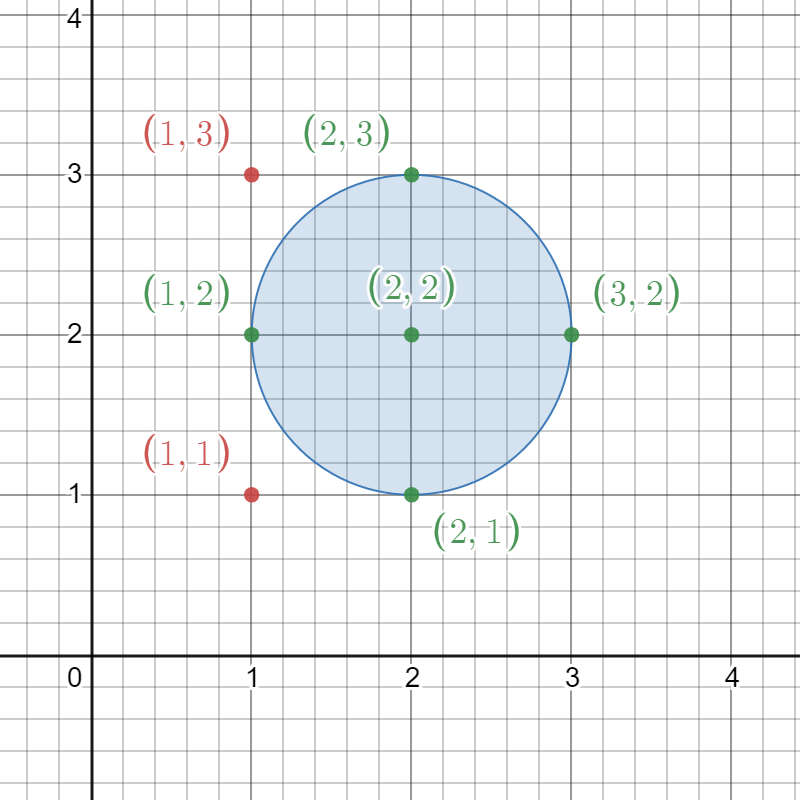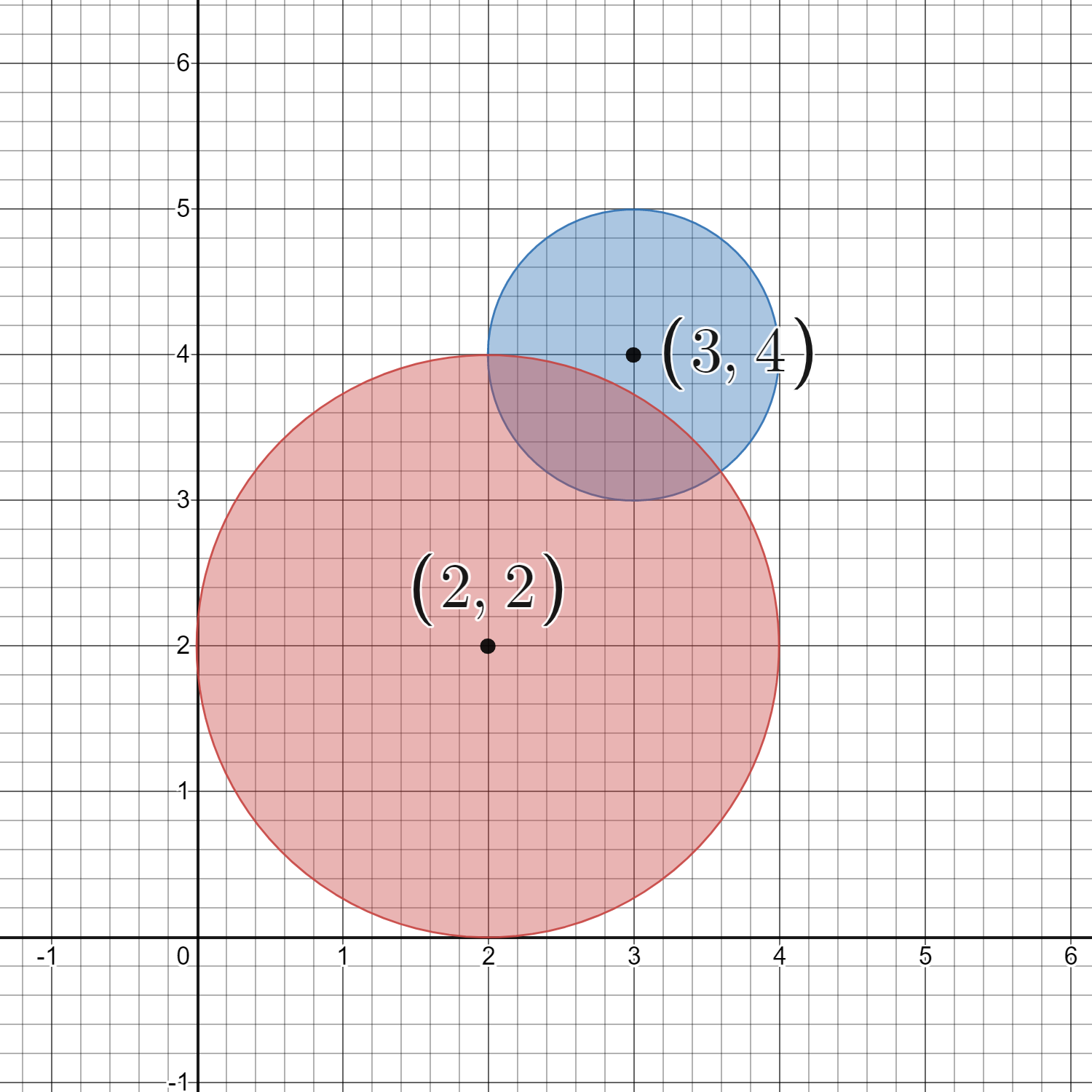Welcome to Subscribe On Youtube
Formatted question description: https://leetcode.ca/all/2249.html
2249. Count Lattice Points Inside a Circle
- Difficulty: Medium.
- Related Topics: Array, Hash Table, Math, Geometry, Enumeration.
- Similar Questions: Queries on Number of Points Inside a Circle.
Problem
Given a 2D integer array circles where circles[i] = [xi, yi, ri] represents the center (xi, yi) and radius ri of the ith circle drawn on a grid, return the **number of lattice points **that are present inside **at least one circle**.
Note:
-
A lattice point is a point with integer coordinates.
-
Points that lie on the circumference of a circle are also considered to be inside it.
Example 1:

Input: circles = [[2,2,1]]
Output: 5
Explanation:
The figure above shows the given circle.
The lattice points present inside the circle are (1, 2), (2, 1), (2, 2), (2, 3), and (3, 2) and are shown in green.
Other points such as (1, 1) and (1, 3), which are shown in red, are not considered inside the circle.
Hence, the number of lattice points present inside at least one circle is 5.
Example 2:

Input: circles = [[2,2,2],[3,4,1]]
Output: 16
Explanation:
The figure above shows the given circles.
There are exactly 16 lattice points which are present inside at least one circle.
Some of them are (0, 2), (2, 0), (2, 4), (3, 2), and (4, 4).
Constraints:
-
1 <= circles.length <= 200 -
circles[i].length == 3 -
1 <= xi, yi <= 100 -
1 <= ri <= min(xi, yi)
Solution (Java, C++, Python)
-
class Solution { public int countLatticePoints(int[][] circles) { int xMin = 200; int xMax = -1; int yMin = 200; int yMax = -1; for (int[] c : circles) { xMin = Math.min(xMin, c[0] - c[2]); xMax = Math.max(xMax, c[0] + c[2]); yMin = Math.min(yMin, c[1] - c[2]); yMax = Math.max(yMax, c[1] + c[2]); } int ans = 0; for (int x = xMin; x <= xMax; x++) { for (int y = yMin; y <= yMax; y++) { for (int[] c : circles) { if ((c[0] - x) * (c[0] - x) + (c[1] - y) * (c[1] - y) <= c[2] * c[2]) { ans++; break; } } } } return ans; } } ############ class Solution { public int countLatticePoints(int[][] circles) { int mx = 0, my = 0; for (var c : circles) { mx = Math.max(mx, c[0] + c[2]); my = Math.max(my, c[1] + c[2]); } int ans = 0; for (int i = 0; i <= mx; ++i) { for (int j = 0; j <= my; ++j) { for (var c : circles) { int dx = i - c[0], dy = j - c[1]; if (dx * dx + dy * dy <= c[2] * c[2]) { ++ans; break; } } } } return ans; } } -
class Solution: def countLatticePoints(self, circles: List[List[int]]) -> int: ans = 0 mx = max(x + r for x, _, r in circles) my = max(y + r for _, y, r in circles) for i in range(mx + 1): for j in range(my + 1): for x, y, r in circles: dx, dy = i - x, j - y if dx * dx + dy * dy <= r * r: ans += 1 break return ans ############ # 2249. Count Lattice Points Inside a Circle # https://leetcode.com/problems/count-lattice-points-inside-a-circle/ class Solution: def countLatticePoints(self, circles: List[List[int]]) -> int: s = set() for x, y, r in circles: s.add((x, y)) for dy in range(y - r, y + r + 1): for dx in range(x - r, x + r + 1): dist = (dx - x) ** 2 + (dy - y) ** 2 if dist <= r ** 2: s.add((dx, dy)) return len(s) -
class Solution { public: int countLatticePoints(vector<vector<int>>& circles) { int mx = 0, my = 0; for (auto& c : circles) { mx = max(mx, c[0] + c[2]); my = max(my, c[1] + c[2]); } int ans = 0; for (int i = 0; i <= mx; ++i) { for (int j = 0; j <= my; ++j) { for (auto& c : circles) { int dx = i - c[0], dy = j - c[1]; if (dx * dx + dy * dy <= c[2] * c[2]) { ++ans; break; } } } } return ans; } }; -
func countLatticePoints(circles [][]int) (ans int) { mx, my := 0, 0 for _, c := range circles { mx = max(mx, c[0]+c[2]) my = max(my, c[1]+c[2]) } for i := 0; i <= mx; i++ { for j := 0; j <= my; j++ { for _, c := range circles { dx, dy := i-c[0], j-c[1] if dx*dx+dy*dy <= c[2]*c[2] { ans++ break } } } } return } func max(a, b int) int { if a > b { return a } return b } -
function countLatticePoints(circles: number[][]): number { let mx = 0; let my = 0; for (const [x, y, r] of circles) { mx = Math.max(mx, x + r); my = Math.max(my, y + r); } let ans = 0; for (let i = 0; i <= mx; ++i) { for (let j = 0; j <= my; ++j) { for (const [x, y, r] of circles) { const dx = i - x; const dy = j - y; if (dx * dx + dy * dy <= r * r) { ++ans; break; } } } } return ans; }
Explain:
nope.
Complexity:
- Time complexity : O(n).
- Space complexity : O(n).